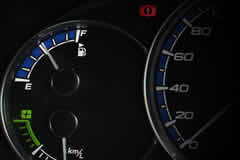Why is the Fuel Consumption of My Car So Low? - Vol.191
Fuel consumption is an issue that everyone can relate to. Optimizing this aspect of our vehicle is one of the main ways of saving significant amounts of money over the long term. Many people will purchase a new vehicle, and after a few years they will notice that the car's performance is not what it used to be. What causes this, and is their anything that can be done about it?
The truth is that there is no sure fire way to guarantee an increase in fuel efficiency. However, there are a multitude of factors that can affect your average mpg. Once you identify these factors it is up to you to test them out, and to see which ones give you the best results.

Problems of the Past
The modern day car is a completely different machine than the cars of the 70's, 80's, and even 90's. Technology has changed the way that vehicles operate, and as a result the way that we trouble shoot our cars has changed.
In the past, when fuel efficiency became a problem the owner would usually bring his or her vehicle in for a tune-up. After a significant amount of driving the mechanical parts in the older cars would become misaligned. By giving your car a tune up these misalignments could be restored back to their ideal factory settings.
Another common practice was adjusting the carburetor. These changes would affect the way fuel was being mixed. For example, if your carburetor was mixing fuel to rich it could be adjusted to produce a leaner mixture, which would result in better fuel efficiency.
However, these tried and true systems have sense been replaced by electronics, and a simple tune up will no longer suffice.
Modern Day Issues
There are quite a few factors that could be influencing your engine's performance in a negative way.
First, the duration of your average trip could be a hindrance. If you commonly make short trips you are guaranteed to be less fuel-efficient. Driving at low speeds, idling for extended periods of time, and having to frequently start your car will all contribute to a lower average mpg.
Another issue that is commonly seen is driving in heavy traffic. For those of us that work and live in highly populated areas this may be unavoidable. However, frequently driving in stop-and-go traffic will severely limit your car's efficiency.
Thirdly, your engine could be operating at a temperature that is higher than normal. This is almost always a result of old coolant in the system, or of using only water. You can add miles to the gallon by replacing your coolant, and ensuring that you are using the optimum mixture.
In addition to this, under inflated tires will impact your vehicles performance. When your tires are not adequately inflated they will contact the road with increased surface area. This will increase drag and friction resulting in worn out tires and lower mpg.
Lastly, the easiest way to boost your fuel efficiency is by driving at an optimum speed. It has been shown that engine efficiency can drop as much as 15% when driving over 65 mph. By hitting and maintaining this economical speed you will increase performance and save money.
Re-cap
Now that you know what you should be looking for it is time to perform some tests. Check your tire pressure monthly; maintain a reasonable speed; walk or ride a bike for short distance trips; and be sure to change your vehicle's fluids regularly. By doing this you will maximize the performance of your car, extend its life, and save money.